CENTER COMMUNITY NEWS
Newsletter of the Center for Sacred Sciences
Vol. 35, No. 1 • Winter 2022
Zooming Through the Pandemic
Two years ago, CSS closed its doors at 5440 Saratoga Street to help prevent the spread of COVID-19. Since then, our Sunday meetings, practitioners meetings, retreats, and workshops have taken place via Zoom. Although we have missed gathering in person, we discovered that the Zoom format brought with it some benefits. Zoom opened up our meetings to friends from around the world, as far away as Europe and Australia. Remote CSS teachers Andrea and David, who live in California and Washington, have given regular talks on Sundays and lead practitioners groups. The Zoom format also has allowed local homebound practitioners to attend meetings. So, in some ways, it has brought our community closer together. Meanwhile, we continue to look forward to the day when we again open our doors at Saratoga to in-person meetings. Last fall we re-opened the library to a contactless service, and work is now in progress to allow our future meetings at Saratoga to take place in hybrid format, allowing both in-person and remote participation via Zoom. Stay tuned!
Please Call Me By My True Names, a poem by Thich Nhat Hanh
Joel would like to recommend to our whole Sangha this beautiful poem by Vietnamese Zen master Thich Nhat Hanh. Listen to it and hold it close to your heart as you watch the news in our troubled times. Read and Listen to Thay's reading and explanation of the origin of the poem.
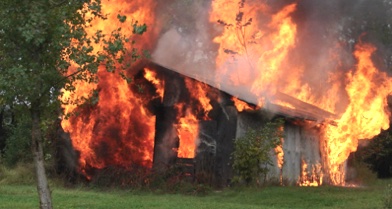
Bonfire of the Vanities, a Parable, by Wesley Lachman
Over the years he had managed to stuff his garage full of ideas and thoughts for improving other people and solving political problems. To the casual observer walking by, it looked as if Hal had an exceptionally clean garage. All the tools were hung neatly on the wall, the floor was swept and a few boxes were stacked in the corner. But Hal knew that it was stuffed and cluttered with ideas that he didn’t want to have roosting in his head.
Most of his ideas for what other people should do were kept right on top or just beneath his workbench. He wanted to be able to grab them as needed. But sometimes, maybe usually, he needed to work on them before they were ready for “prime time.” For example, Mrs. Henderson, who was a widow, lived next door: he had an idea for her, “Hey, Ms. H, you need to invest in some new clothes and then maybe someone will find you attractive.” For his boss, he thought, “Mike, Mike, they are only human, man. Would it be so painful for you to show a little empathy?”
To his credit, Hal also had some critical thoughts regarding himself that he kept in a little locked box near the window. He rarely opened the box because he never knew what to do with the information. Some ideas were negative: how he was rather inferior, how he had never really accomplished much. Some were positive: how he had a wonderful family and supported worthy causes.
Last summer, when the family was vacationing out at the coast, they were walking the beach when a sneaker wave hit. Eloise, his 3-year-old, was torn from her mother’s grasp and started to be drawn back into the crashing waves. The receding water tugged and pulled at her little body. Hal flashed back to college baseball when he would dive for home plate, and ran stumbling while the water pulled the sand from under his shoes. A flying dive and he grabbed her leg. She was safe, just barely. Badly shaken and dripping wet, the family returned to their motel.
Strangely, at the very moment that Eloise was in mortal danger, a small flame appeared within the back wall of Hal’s garage. It spread quickly to engulf the whole place in flames and burned it to the ground before fire people could arrive. No one was able to reach the family, so when they pulled up in front of the house the next day, they were shocked to see a smoldering square of ashes where the garage had stood.
It took Hal until the next morning to notice that all his thoughts and ideas had also gone up in smoke. He no longer had stacks of opinions about people and issues. The place where they used to fill up his mind had become empty. And immediately that space became filled with what was now: tables and books, grass and trees. And “Oh my Lord,” he said to himself, “What I think about people is gone, and now I have just the people, just this one, and just that one!” He saw Mrs. Henderson in her yard, “Hey, Mrs. H, you’re looking well.”
Flash Flood, a true story, by Merry Song
Merry Song holds a Masters of Fine Arts in Creative Writing and is a teacher with the Center for Sacred Sciences.
She leads spiritual writing workshops using creative writing as a tool to cultivate awareness and illuminate The Story of I.
She may be contacted at
"Flash Flood" is an example of Fragmentary Literature using the second-person point of view and variable verb tense. Merry Song wrote the entire piece as daily writings after the dangerous interruption of a wilderness canoe trip on the Green River of Utah.
(1)
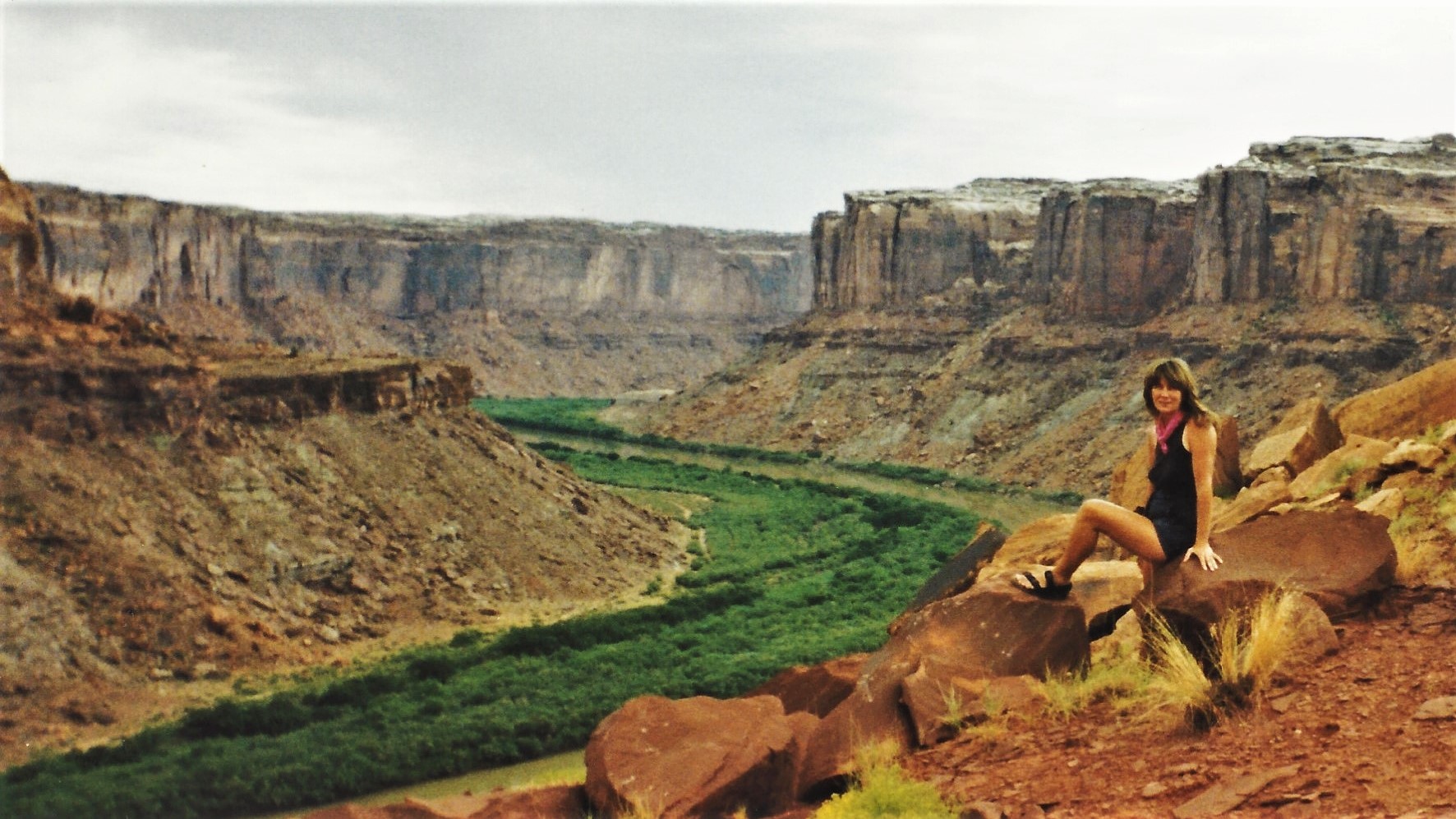
Your name is Chaos. That’s what your partner, Freedom, has been calling you for the last few days. You decided to take the name Chaos when you read a quote in a book you brought along on this river trip: “Give up control; live in chaos.” When you saw those words, you recognized the truth. We only think we have control. Look closely: Your sense of control is false security—an illusion. Better to live in chaos, because within chaos, true freedom resides. You are free when you realize that the YOU—you controlling everything—is fiction.
(2)
What would it be like if everything were washed away? You are drifting on the Green River in Utah just as you are drifting through life when suddenly you are caught off guard by a flash flood pouring in and changing everything.
Okay—this is where it gets good because on the tenth day of the canoe trip, you did not know that by the end of another bright, hot August day, you and Freedom would be stranded in a narrow red rock wash. You would see all of your possessions marching downriver away from you.
(3)
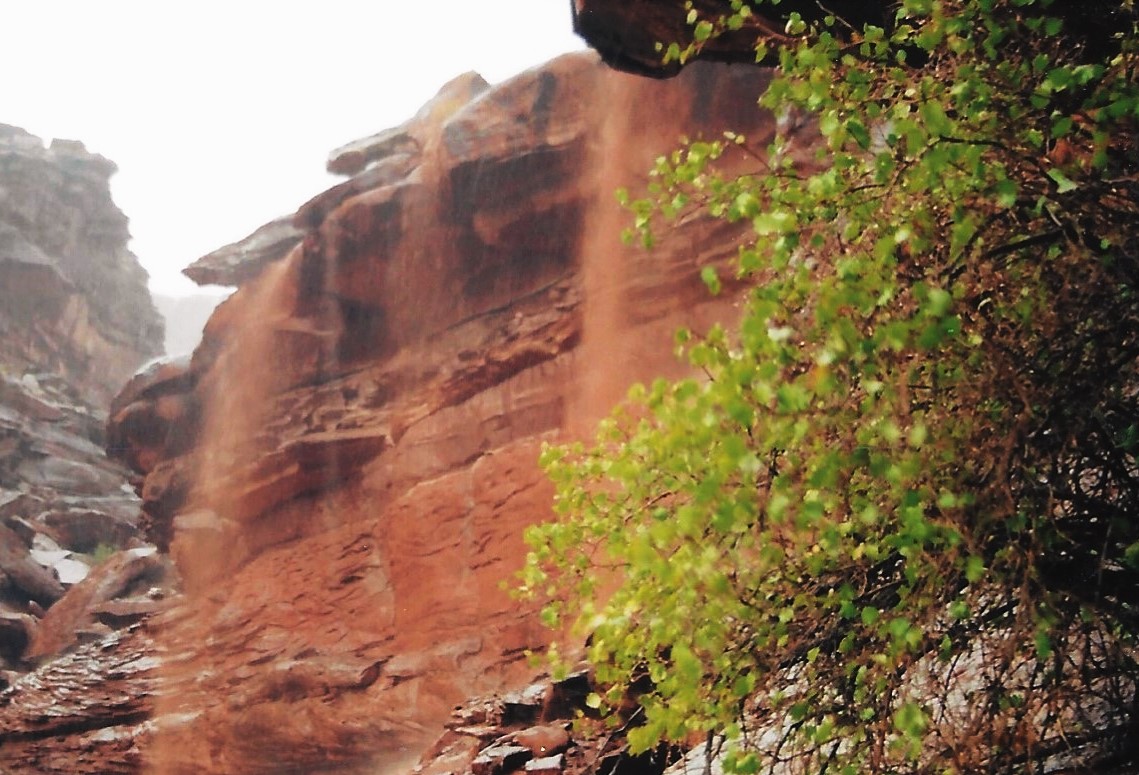
Back up. You haven’t seen people for days, and you’re glad of it. You wish you could go the whole fourteen days without seeing anyone. You scan the marvelous sky, observing countless shapes in the strong white billows gliding around in the sparkling blue. That’s when you see it: a strange formation building up over the horizon— a giant, inverted triangular cloud. It has horns reaching out from the two upper corners.
“Thunderhead,” Freedom announces, and you both watch it—way over there. You’ve been in lots of thunderstorms out here in the wild, and you think about the violence of this rising horned monster. Better get off the river and let it pass, you both think out loud.
You drift, no, you paddle along; better to speed up. Get where you’re going as fast as you can.
You both see an opening into a little side canyon on the left. A thick white sand ledge fans out in front of it. Behind the sand is a mini forest of tamarisk trees, and then red rock ledges steeply rise. You spy a dark, inviting pocket on the right hand side about forty feet up. Looks like an ideal place to sit while the rain passes.
Freedom ties the canoe so that the rope is securely looped around a big immovable rock. You both tamp the blue tarp around everything in the canoe and secure the tarp with bungee cords. It looks like a tight, safe package that won’t blow around in the wind.
Wearing only a long t-shirt with a camera on a strap over your shoulder, you climb out of the river bottom, pulling yourself up a couple red ledges, and there you are, inside the pocket, happy to be protected while the rain begins to pour.
Right now you and your partner are gleeful. You’re safe in the pocket, and the smell of rain enlivens you. You laugh, you talk. Freedom has brought a small daypack, and when the rain starts to blow into the pocket, you use the pack to shield your bare brown legs.
(4)
When did it change? At what moment did it change from fun rainstorm to danger? Perhaps when Freedom tried to count the seconds between the lightning and the thunder—and there weren’t any. The storm was right over your heads, somehow inside your heads, and you shrieked comically at first, and then choked on your breath.
“I’m worried about the canoe,” Freedom shouted. She struggled to stand up in the wind and peer around the corner to where it was tied. You followed her. The silver canoe was rocking gently—everything was okay.
(5)
Little do you know that this night you will be sleeping on that very sandstone ledge you are sitting on now. You will wish to God that you had grabbed your pack out of the canoe. And oh God—the blankets, the water, the food. Had you known, you would have unloaded it all into a safe haven. But you did not know. And you are about to answer your own question: What would it be like if everything were washed away?
(6)
“This is fear!” you announce. And you say it again, standing up with your arms out. The emotion is at once repulsive and attractive. Ah, you’re alive with incredible energy! The rust-red waterfalls are shouting off every ledge, roaring down this little crevice, rumbling and roiling to the river. Could the water come this high and fill your lungs?
Fear permeates every cell of your body as you witness the majesty of this fierce storm and the way the earth gives into it. A violent surrender. The tamarisk trees in the wash below are thrashing about in a mini cyclone. Water rushes off every ledge. The sandstone, the sky, the river, even your body is the same hue of burnt red. You’re all in this together and fear has blasted your heart.
Flash flood. Flash flood! And you think: what would it be like if everything were washed away?
“I’m worried about the canoe,” Freedom says again. She struggles into the rain so she can see over the edge. She comes back drenched. “It’s still there,” she says, but her voice is weak.
Your throat is clutched, red rock fingers tightening their grip.
Then you see the white sand bank below collapsing into a chaotic red churn. The trees are blowing down into the rumbling wash before slamming into the river. You are not in control. You are living in chaos.
And now you get up and burst out into the rain. You look down at the rushing water. And now you say it: “I can’t see the canoe!” And you know that you and Freedom have lost something vitally important. You could die from this. Exposure. Starvation. Dehydration. You crawl back into the pocket, shivering. Chaos and Freedom existing side by side. Fear arising and fear rushing through.
(7)
When the storm begins to loosen her grip on your little world, you both emerge from the pocket. Freedom climbs down to where the canoe was last seen while you crawl up to an overlook of the river.
That’s when you see it. Everything washing away: the red food bin, the blue water jugs, the black bedding bag—there they go drifting farther and farther. Can you not reach out into the racing current and get anything back? You call out to Freedom and she’s calling out to you to look at the massive waterfalls pouring into the river, but you can’t see them.
You can only see everything being washed away in a flash. The objects you think your life depends on all seem so peaceful out there marching swiftly in single file farther down the ancient canyon. A temporary eddy creates a merry-go-round for a hiking shoe, a wooden cutting board, a book in a clear plastic bag—the very book that said: “Give up control; live in chaos.” The book spins round and round. In the face of loss you chuckle over the book, saying out loud, “Farewell, my teacher.”
Meanwhile Freedom has torn herself away from the waterfalls and is down at river level watching the possessions rush away. She’s assessing the situation as the rain patters to a close. You climb down to her, and then you realize what she is looking at. The canoe is still tied up—that is, the rope is still tied around the massive rock. The other end of the rope goes tightly down, down into the opaque red water.
Now you get it. The canoe, stripped of almost all of its contents, has been buried. The ground has opened up and swallowed it in a deep grave—but that’s not quite right. It’s that new ground has been suddenly formed, and the canoe has become part of it.
Just looking at the muddy water you see nothing except the rope coming up out of it. Both you and Freedom hunch down in the water and feel around blindly. Together with considerable force, you unearth the blue tarp that was holding everything in. Yes, the tarp stayed hooked to the canoe while everything else was thrust out by the power of the churning flood.
Instinctively you know that anything you can save is vitally important. And look—the canoe itself is down there. There’s hope of getting it out. You both start blindly digging with your bare hands through the sand and thick clay.
There’s an oar down there, you can feel the end of it. If you have a canoe and two oars you can paddle on down river to the confluence where the canoe service meets you. Yes, you can get out of this chaos, can’t you?
You and Freedom dig and dig, but no. The task is enormous. There’s no way you’re going to dig up this fresh underwater grave with your bare hands.
Your eyes glide across the sky. Nightfall is near. You’re all wet and you have no dry clothes or blankets. Can you find a way to survive the night? You are dazzlingly alive with fear.
(8)
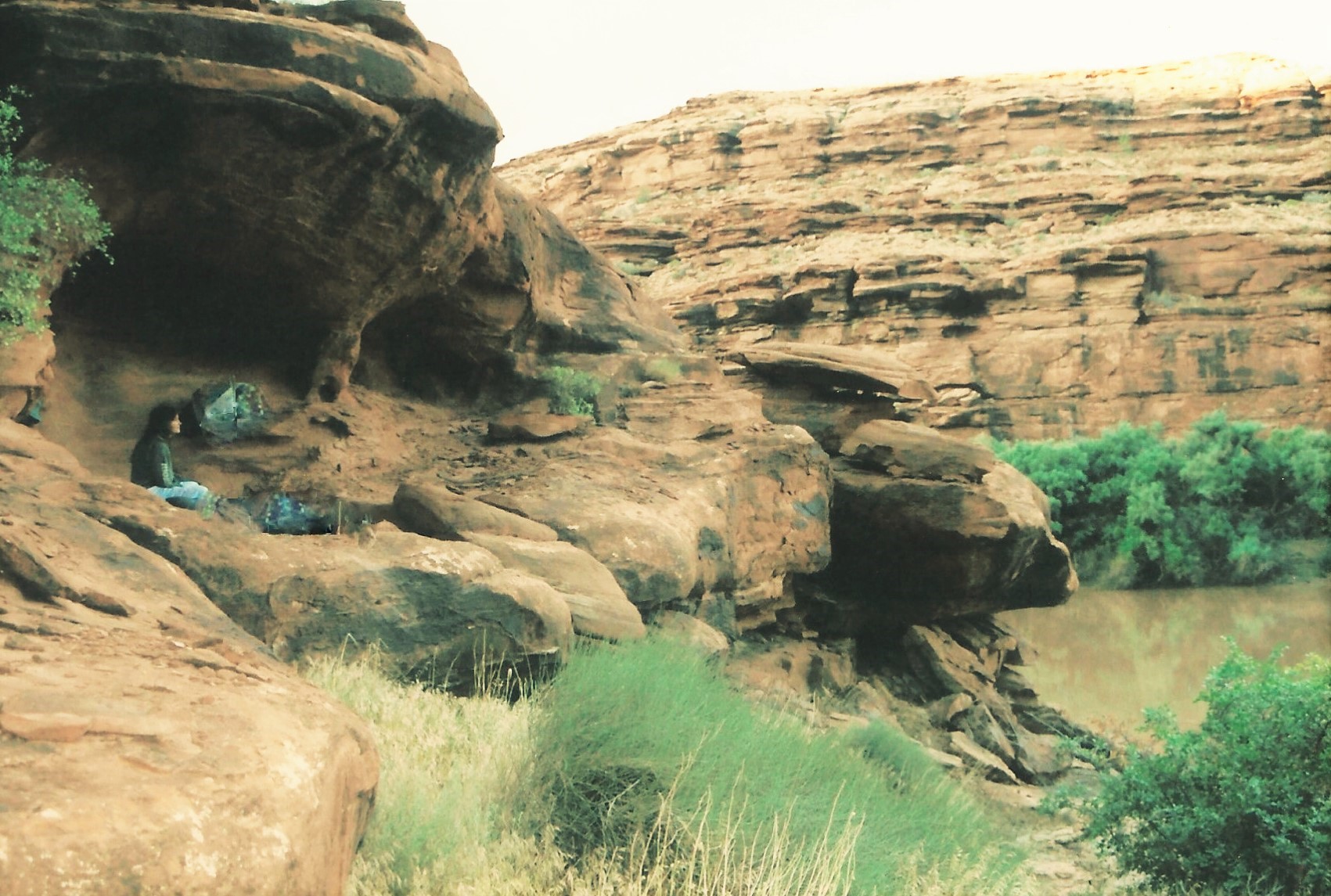
Climbing back up to the pocket, you and Freedom take inventory. Between the two of you, you have about a half liter of water and one granola bar. Water, of course, is the main concern. It is, after all, a 100-degree wilderness desert. Will you have to drink the muddy river which is now deep red with run-off debris?
You’re both wondering what you’ll do in case the storm returns, and you discuss how to create a tent in the middle of the night with the blue tarp.
You scan the sky. Fluffy whites are passing by, and the setting sun extends glittery rays to touch the now calm river. You laugh. You remember that during the height of the storm, you whispered, “Please God, help us.” In that brief moment you believed that there was a God, and that God could help you. Now those God-like rays create a remarkable beauty in the sky. A sign maybe. A sign that everything is helping you all the time—even if it looks like loss.
A wave of sorrow passes through your heart and you cry. The canoe trip as you have known it, the gentle drifting and wild nakedness unfolding layer by layer, is over.
Something else has taken its place, and while you do feel grief, you also feel a tremendous awe. You are in this moment and you know it.
Before you lay down on the red ledge for the night, you grasp the bottle and say, “I’m going to take one swallow of water.” You hold that swallow in acute awareness, meeting the sensations of the swallow from beginning to end.
How can one swallow of water bring you full force into authentic life? You feel lightning flash through your mind. Tingling, you lie down next to Freedom on the hard ledge and notice dreams wanting to arise. Throughout the night you open your eyes and feel mothered by the clear night sky, the planet Mars particularly bold in its caress.
(9)
What would it be like to be stranded in a tiny side canyon with no food and water, not knowing how this whole unexpected adventure is going to turn out? You know that in two days’ time you are to meet the canoe shuttle at the confluence with the Colorado River some eighteen miles from where you are now. If you are not there at the appointed time, would they come looking for you?
When you and Freedom wake up that morning, it’s cold—you start shivering at first light—but you know before long that bold, hot sunball will be up and you’d be glad to feel it. Climbing down to the lower ledge you both scan the river. Quiet. No other canoeists in sight under a cloudy morning sky.
You both mindfully have one swallow of water, slowly, slowly, and half of the granola bar before going to work on the canoe. It’s still chilly when Freedom submerges herself in water up to her chin and starts blindly digging down to the inside of the canoe. You stand back, shivering. You wait for the sun. You are radiantly alive.
(10)
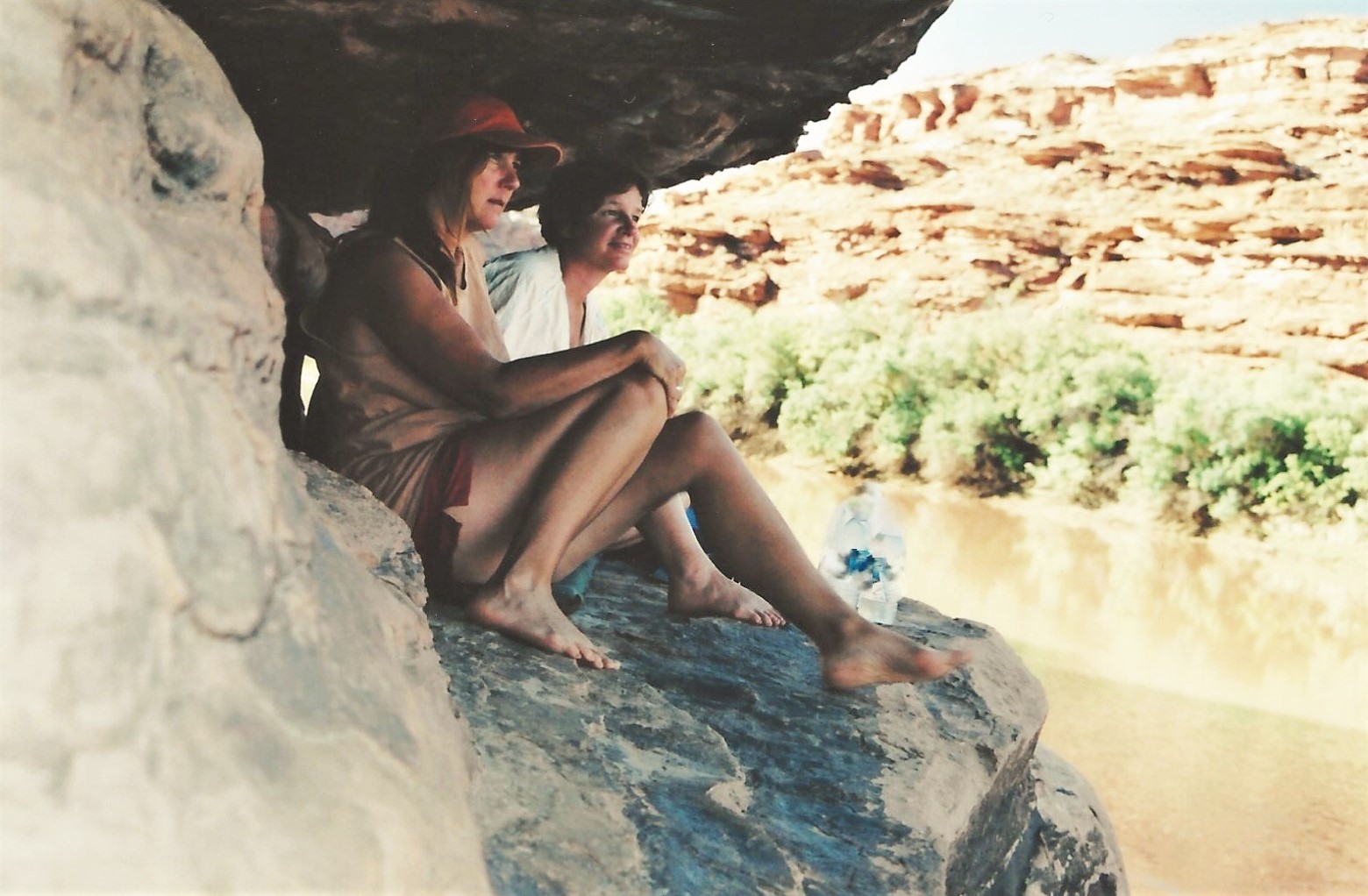
What would it be like if instead of resenting other river people who interrupt your peaceful drift, you long for them? You’d like to see some big, strong, noisy people appear, and together you’d all get the canoe out and you’d go on down river and get an early pickup.
You contemplate this scenario, look longingly upriver, and then slosh down on your hands and knees into the dark water to start digging. There’s the matter of digging out the inner canoe where you might even find more objects buried under the mud and sand, and then there’s the attempt to lift the 18-foot canoe out of its heavy grave. Freedom has actually unearthed a blue plastic cup and is using it as a digging tool (her fingernails now all jagged)—the two of you trade it back and forth, lifting cupfuls of mud from the inside of the canoe while the river current fills it back in. It’s all blind work—you can’t see what you’re digging at. You can only feel around and grasp the sand and clumps of gooey clay. That’s when you realize that the back tip of the canoe is wedged beneath an underwater ledge of solid rock.
(11)
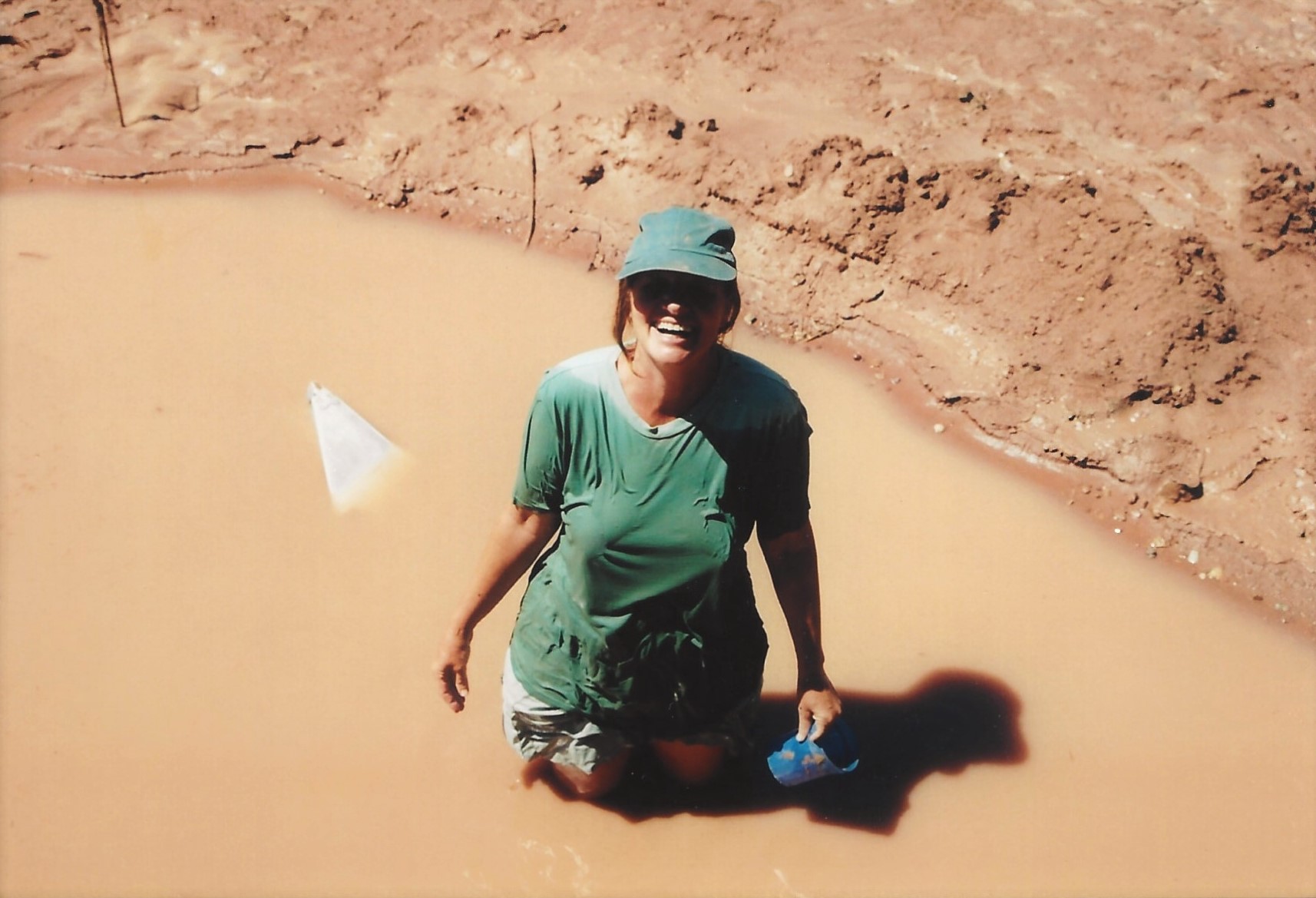
River people are going to come by. In fact, you’re going to call out to tiny figures appearing upriver. “We need help!” you’ll call, and two young shirtless men will glide in on kayaks and spend hot hours digging with you, lifting—no, just trying to lift. And they will feel defeated and perhaps ashamed that they can’t help you and must leave you stranded. No room in their kayaks for passengers. Their supplies nearly depleted, they give you a gallon of clean water, a half jar of peanut butter. Apologies.
That night you will lie down on the ledge with peanut butter in your belly. As soon as the sun goes down, you will fall asleep—exhausted—and when you wake up during the night, you will hear a strange animal crooning and you will see the night sky dancing with Mars.
(12)
After the second night on the ledge you woke up in the morning predicting something would happen. When the men reached the confluence of the two rivers at noon that day, they would alert the National Park Service. You pictured someone coming after you in a motor boat, puttering upriver only eighteen miles. Maybe the motor boat person would bring shovels and free up that canoe so you could go on your merry way. Or maybe you’d just have to get in the motor boat and leave it all behind.
That morning you and Freedom went back to work on the digging. You both felt like you were hearing motors in the distance.
“Something’s going to happen,” you said, but you realized what a vague statement that was and laughed at yourself. Something always happens—or at least appears to.
(13)
Yes, a motor sound is getting closer. You both stop digging and stare downriver. Nothing. You sit on the overlook dangling your legs and think about what you have lost: all your clothes, your good hiking shoes and Birkenstocks, your blue dome tent that protected you on so many journeys. The list grows: your glasses, your dental retainers, your six rolls of shot film, your precious notebook with ten days’ worth of journal writing, your crystal necklace. But most of all you picture the vanished food bin still quite full at the time of its disappearance. And then ten gallons of clean water in jugs: where did it go?
(14)
When the helicopter appears, Freedom is still down in the murky water digging and you are standing on the ledge looking up. Oh my God! The shiny helicopter circles you like a beautiful buzzard. You are at once embarrassed. Is your situation so bad that they had to send in a helicopter? Are they going to lower down a rescue rope and lift you out? You watch them and try to smile broadly. Can they see the expression on your face? How can you let them know that you are acutely alive? You don’t want to be rescued from this awareness.
You and Freedom nervously laugh back and forth when the helicopter disappears from view and the motor sound stops.
What does this mean? Have they determined that you are okay and have gone on their way to much more important crises?
“They landed up there somewhere,” Freedom says pointing to the white rim far above.
“You’ve got to be kidding!” you say.
“Listen,” she says. And you both listen hard as tiny voices grow louder.
And now you actually see them up high on the canyon wall: two figures, a small woman and a tall man, both wearing bright yellow shirts and green pants, carefully scouting their way down to the river.
They’ve come to rescue you. But do you want rescuing? Can you not live forever in your red rock awareness while accepting the generosity of passers-by? If they take you out of here, will you leave your awareness behind?
Yes, you are about to be led out—up, up to where the now invisible helicopter is waiting to remove you from the river’s edge.
(15)
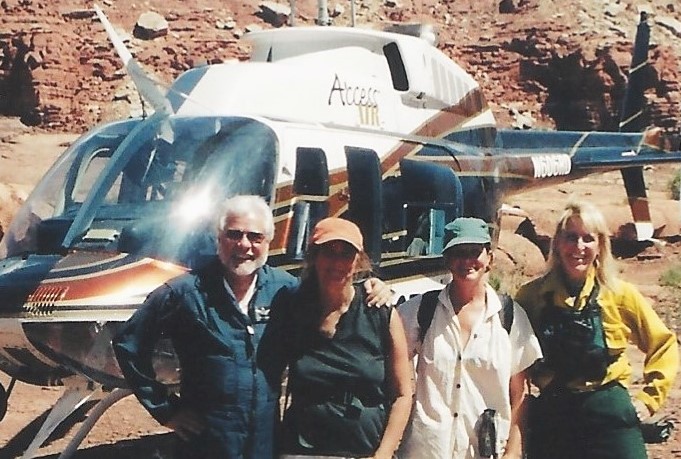
It’s a dangerous hike barefoot, but you don’t care. What you care about is the rapidly changing situation. First you are there so close and connected to the red rock ledge and to the task of trying to free the canoe, and now you are suiting up in overalls and a crash helmet to board a rescue helicopter.
As the helicopter lifts off the ground, your body is flooded with exhilaration. You have never been in a helicopter before and you get a magnificent view. The massive Canyonlands spread out forever, and you laugh at your good fortune of being able to get this bird’s eye view of your now tiny world below.
The helicopter lands at park headquarters and you and your partner are met by a friendly man who will drive you back to the canoe service. This man, the helicopter rescue team, and the kayakers who stopped to assist you on the river, have displayed what appears to be genuine kindness. In your vulnerability, people have come forward to help, and you rejoice in the opportunity to receive their kindness.
(16)
You will sit at home and wish you were still out there on the red rock ledge. You will know that this attachment to the past can only bring you suffering, but the taste of acute awareness is still on your tongue, and oh, how alive you were. You will wake up in the night with dreams of roaring water and churning storms and you will recognize how your fear of death transformed into full force awareness. You will savor the memory of a simple swallow of water, the touch of bare feet on red rock, opening your eyes to the night sky. You will long to be alive again.
Library Corner
The Center maintains a lending library containing thousands of books, audio CDs, video DVDs, magazines, and journals for patrons to explore the classical teachings of the mystics from all the world's religious traditions. See the Library Blog for quotes, reviews and new additions to the library.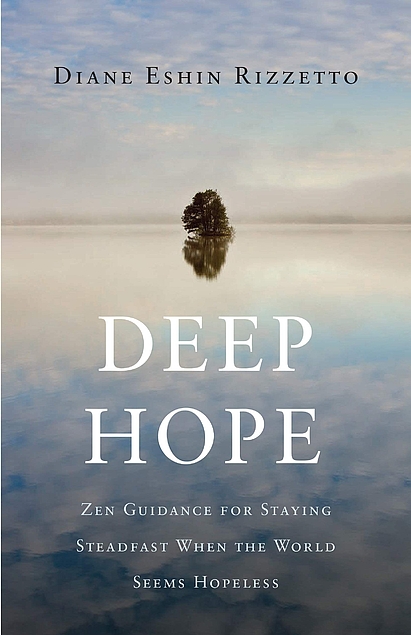
Deep Hope: Zen Guidance for Staying Steadfast When the World Seems Hopeless
By Diane Eshin Rizzetto
“As is true for all the paramitas, the Paramita of Giving and Receiving is a cyclical transformation. We begin by making an explicit, conscious effort to enact generosity. We make an outward gesture of our deepest capacity toward letting go into openness. At the same time, we look toward receiving, making an effort, perhaps a gesture, that affirms that we receive as well as give. Finally, forming full circle, our receiving turns to thanks as we give forth gratitude.” (p. 16-17)

Love on Every Breath: Tonglen Meditation for Transforming Pain into Joy
By Lama Palden Drolma
"Spiritual practice does not only happen during meditation. Throughout each day, we can train ourselves to remember bodhicitta. For example, when we read the news in the morning, we can think: I want to lead people out of suffering, I want to awaken to be able to make a difference. We don't need to feel powerless. It often seems like things are going in the wrong direction, but love is stronger. Truth is stronger.. If we continue to cultivate bodhicitta, it awakens our heart continuously so that our love and compassion get stronger in the face of any situation we meet." (p. 95-96)
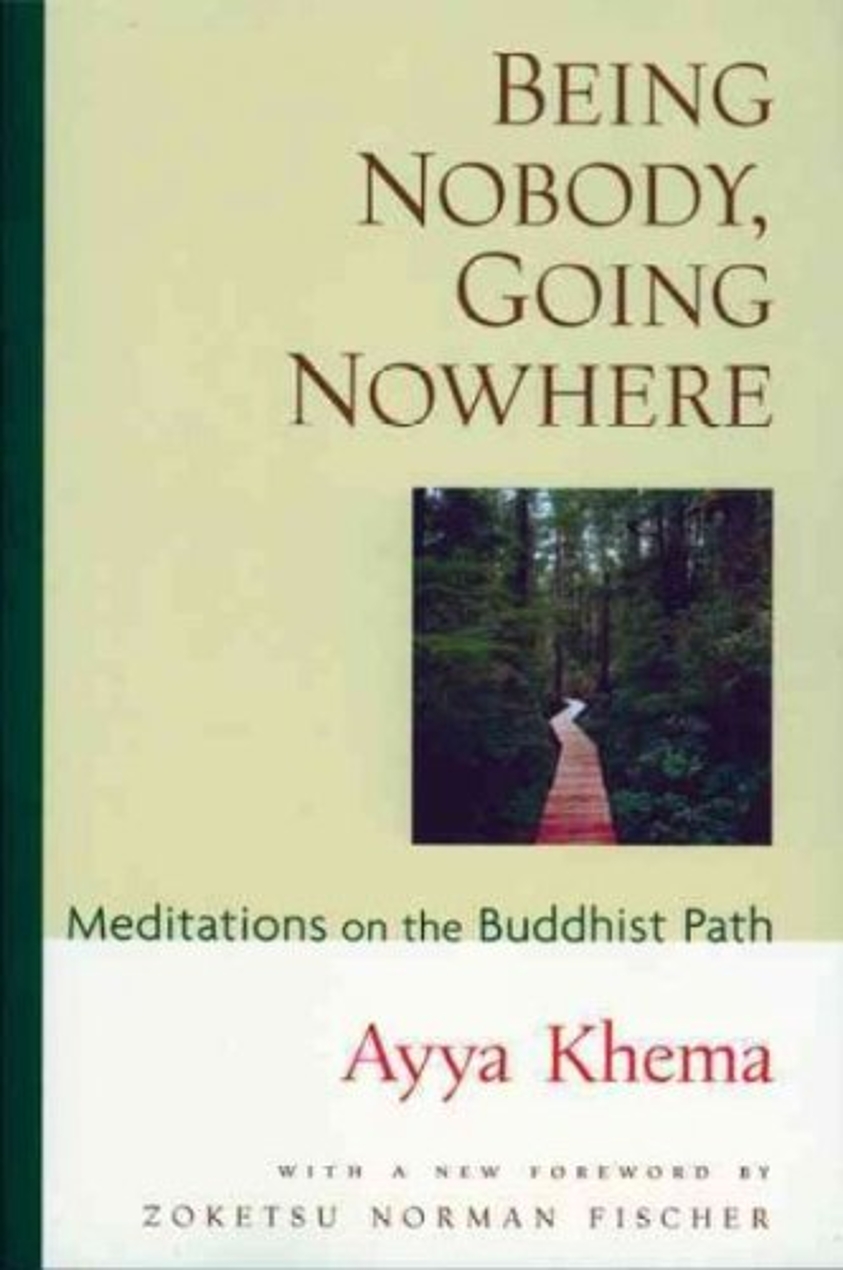
Being Nobody, Going Nowhere: Meditations on the Buddhist Path
By Ayya Khema
"The Buddha said that the unenlightened, untrained disciple has two darts or two arrows that are hurting him and the enlightened, trained disciple has one. The two arrows are mind and body, and the one is the body only. The Buddha also fell ill sometimes, but he continued to teach. It didn't stop him at all." (p. 117)
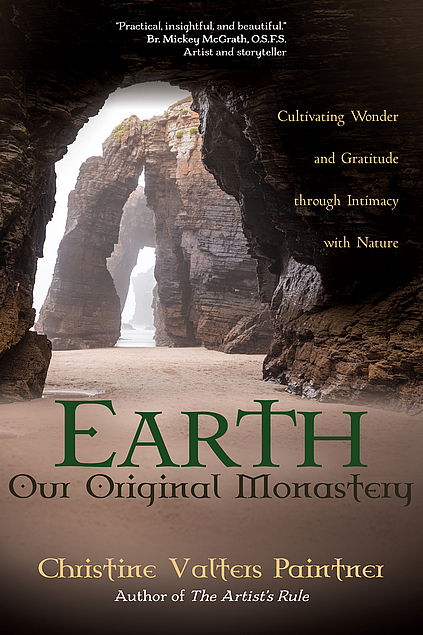
Earth, Our Original Monastery: CultivatingWonder and Gratitude Through Intimacy with Nature
By Christine Valters Paintner
"Icons play a significant role in the Eastern Orthodox Christian tradition. Theologically, icons are considered to be sacred as they offer a doorway to communion between heaven and Earth. Icon writing is rooted in the theology of the Incarnation, with Christ being the icon of God, and the icon forms a visible gospel. Often part of the practice is to kiss the icon to show love and devotion toward Christ. Nature is a holy text for many of us, and then icon is a window to the Divine Presence at work in the world. Creation is therefore the original icon, the primordial place of our encounter with God, the Great Artist, who is continually at work in the world around us. " (p. 73)

Echos of Perennial Wisdom: A New Translation with Selected Letters
By Frithjof Schuon
"Spiritual realization is theoretically the easiest thing and in practice the most difficult thing there is. It is the easiest because it is enough to think of God. It is the most difficult because human nature is forgetfulness of God." (p. 20)

Mission and Programs of the Center for Sacred Sciences
The Center for Sacred Sciences is dedicated to the study, practice, and dissemination of the spiritual teachings of the mystics, saints, and sages of the major religious traditions. The Center endeavors to present these teachings in forms appropriate to our contemporary scientific culture. The Center also works to create and disseminate a sacred worldview which expresses the compatibility between universal mystical truths and the evidence of modern science.
Among the Center’s ongoing events are Sunday public services with meditations and talks given by the Center’s spiritual teachers; and — for committed spiritual seekers — weekly practitioners groups and periodic meditation retreats. The Center is accessible. We are a welcoming and inclusive community.
The Center maintains an extensive lending library of books, audios, videos, and periodicals covering spiritual, psychological, philosophical, and scientific subjects. In addition, the Center provides a website containing information and resources related to the teachings of the world’s mystics, the universality of mystical truth, and the relationship between science and mysticism. The Center also publishes this newsletter.
The Center for Sacred Sciences is a non-profit, tax-exempt church based in Eugene, Oregon, USA. We rely chiefly on volunteer staff to support our programs, and on donations to meet our operating expenses. Our spiritual teachers give their teachings freely as a labor of love, and receive no financial compensation from the Center.
About the Center Community News
The Center Community News is published on the CSS website several times a year. Its primary purpose is to help foster a community of spiritual practitioners by sharing original teachings, experiences, reflections, artistic expressions, and reports among members of our community.
To submit your original spiritual reflection, report, poetry or art to the newsletter for publication, please use the newsletter submission form.
To subscribe, unsubscribe, or update your existing subscription to the Center Community News, please use the subscription form.
Center for Sacred Sciences • (541) 345-0102 • General contact form
Mailing Address: 1430 Willamette St. #164, Eugene, OR 97401-4049 USA
Meeting Address: 5440 Saratoga St., Eugene, Oregon, USA
